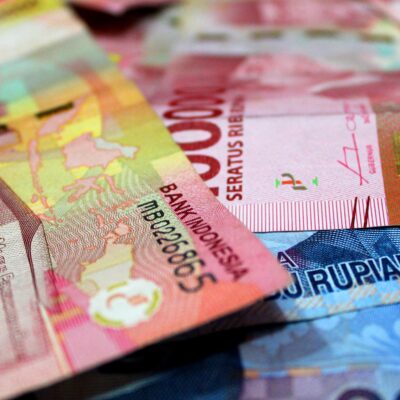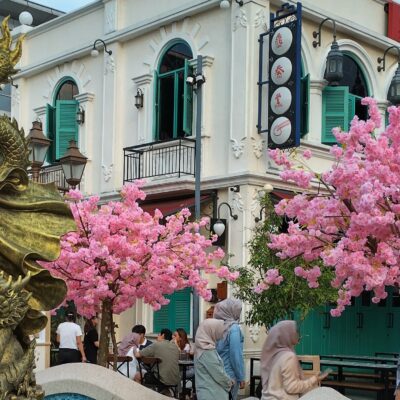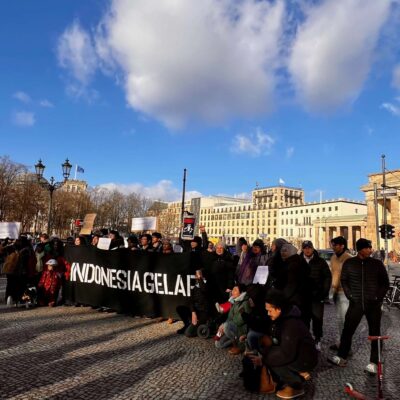As Indonesia’s President Joko Widodo (Jokowi) nears the end of his second five-year term, it is timely to make a preliminary to assessment of his economic legacy, consider what problems are unresolved, and identify some of the challenges for the next president.
Indonesians, living with the consequences, tend to be more critical of their governments than foreigners. The previous administration of Susilo Bambang Yudhoyono (SBY) was derided for being too sluggish.
This has not been the case for Jokowi, not least because of a massive infrastructure program, which has given the impression of a government on the move, as have Jokowi’s popular meet-the-people visits throughout the archipelago. He ends his two terms in office with a remarkable approval rating of around 70 percent. No other president in the country’s democratic era has maintained such strong support. Indonesia faces many problems but, clearly, he is not being blamed.
In terms of macro-economic management and infrastructure, Indonesia may be said to be well positioned for the next decade.
Since the COVID-19 recession, headline GDP growth has recovered to around 5 percent. Although a higher 7 percent rate was sustained during the New Order regime of Suharto (1966-1998), the economy was then much smaller. Indonesia has never achieved the high investment/GDP ratio that drove China’s economy at a spectacular 10 percent during the boom years, but China’s rate has now fallen to below 5 percent.
The World Bank’s recent Poverty Assessment (2023) charts a steady decline in poverty and concludes that extreme poverty has been ‘basically eliminated’, though 16 percent of Indonesians remain poor and many more are vulnerable.
Economic management by Bank Indonesia and the Ministry of Finance has also been satisfactory. Notwithstanding COVID turmoil, inflation has been held to around 5 percent while interest and exchange rates have remained fairly stable.
Jokowi’s necessary focus on improving infrastructure has been both a strength and a weakness. Jakarta has benefited from the first substantial investment in urban public transport since the colonial era; West Java may well benefit from the controversial Chinese-built High-Speed Rail to Bandung (even though the terminus is on the edge of the city); conventional rail services are more efficient; the tollway network has been extended; and better inter-island shipping and ports have boosted domestic market integration.
The weakness is that infrastructure spending is good for the economy only if it boosts productivity. Jokowi’s program has been pushed ahead, often opportunistically, without much prior assessment, and without much cost control by the Ministry of Finance. The extent of waste is an open question.
Two Jokowi governments have had little success in raising the ratio of tax revenue to GDP, which is the prime constraint on financing infrastructure spending. Minister of Finance Sri Mulyani Indrawati had only modest success with tax amnesties and bureaucratic reform. Tax evasion and avoidance are well entrenched and there is little political will to sanction under-reporting and close loopholes. Instead, to finance big projects, the two Jokowi administrations (2014-2019 and 2019-2024) have improvised by raiding state-owned enterprise funds, which has led to all kind of distortions and is not sustainable. The problem is even more acute at the local level, where decentralisation has transferred authority for public health and primary education to local government without commensurate funding powers.
Jokowi’s approach may be juxtaposed with that of the previous SBY administration. Coming from a background as an Army staff officer and supported in his second term by an able technocrat in vice president Dr. Boediono, SBY directed two governments focused on policymaking – that is, they set parameters and delivered programs. Coming instead from a business background, Jokowi has been a dealmaker. Every infrastructure project is another deal. Former Army general Luhut Panjaitan, nominally Coordinating Minister for Maritime Affairs and Investment, but a de facto prime minister, has quietly coordinated who gets the contract, who pays and who gets the fringe benefits. A similar approach has applied to various protectionist trade and industry deals under the rubric of resource nationalism. All these deals have been promoted as ‘a good thing’ but there has been minimal assessment of the net public benefits and little transparency.
The biggest deal of all is, of course, the signature policy of relocating the national capital to the new city of Nusantara in East Kalimantan to escape Jakarta’s subsidence, inundation, floods and congestion. The costs are huge, as also are the opportunities for corruption. Whether the relocation is the best use of public funds is contested but the project appears to have unstoppable momentum.
Scrutiny is much less likely after parliament reined in the Anti-Corruption Commission (KPK). This was a dramatic setback in the fight against corruption and has fuelled public cynicism of the political elite. It is hard to see KPK being allowed to regain its former extraordinary independence and ability to sanction ministers and parliamentarians.
Nevertheless, what might now better be addressed for the good of the nation is the massive under-reporting of income and wealth and the consequent under-payment of taxes. The alternative is a significant increase in the VAT consumption tax, which would be widely unpopular because of its regressive impact. It’s an issue of public choice. Without adequate revenue to fund central and local government programs, Indonesia will continue to be driven with the brake on, whoever steps next into the driver’s seat.
Looking ahead to the next presidency, the greatest concern from an economic perspective is that there will be even less well-informed policymaking and even more poorly assessed and little scrutinised deal-making. With such a low rate of tax revenue, Indonesia will not escape the ‘middle income trap’ if it squanders revenue on ill-conceived projects or leaches it to favoured interests. The coalition for good government looks to be weaker than ever.
The other lurking dragon is global warming with its worsening climate instability and rising sea levels. Because tens of millions of people live at sea level, Indonesia’s cities, towns and villages are highly vulnerable to rising sea levels, storm surges and floods. There are also threats to food supply and public health. Jokowi has talked sensibly about climate change but has not committed political or financial capital to accelerate a lethargic energy transition. Costs will be incurred one way or the other, if not by action, then by inaction. This challenge is also left to whoever will be the next president.
Indonesia specialist Howard Dick is an Honorary Professorial Fellow in the Faculty of Economics & Business at the University of Melbourne.
This article is part of a special co-published series on the Indonesian election led by Asialink’s Insights.
Image: President Joko Widodo visited the Balang Island Bridge on 1 November 2023. Source: Joko Widodo’s Twitter account (@/Jokowi).




